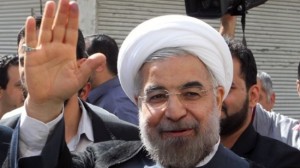 In what observers hope is a sign of a softening of relations with the outside world,†Tehran†has, for the first time since the Islamic revolution in 1979, invited foreign leaders to attend the inauguration of†Hassan Rohani†as president this weekend.
In what observers hope is a sign of a softening of relations with the outside world,†Tehran†has, for the first time since the Islamic revolution in 1979, invited foreign leaders to attend the inauguration of†Hassan Rohani†as president this weekend.When Mr Rohani is sworn in by parliament on Sunday, in a ceremony to be watched live on television by millions of Iranians, he will do so in the presence of nearly 300 parliamentarians, 11 foreign presidents, as well as ≠delegations from more than 40 countries and the UN. Britain has declined the invitation and the US was not invited.
Since the†election of the mild-mannered cleric†in June, a stream of visitors, reformists and fundamentalists, have been to congratulate him on his surprise victory, helped by the last-minute backing of the pro-reform camp. But when he moves from his home in the affluent north of the city to the presidential offices in Pasteur Street this weekend, he will face the monumental tasks of reviving an†economy hit by international sanctions†because of its nuclear programme and restoring relations with the international community.
No other government in his ≠countryís contemporary history ever inherited such huge challenges, the 65-year-old has said.
Inflation stands at 35.9 per cent Ė though economists believe the official figures are vastly underestimated Ė youth unemployment is 28.3 per cent and the rial, the national currency, has fallen 50 per cent since last year.
ďThis is the first time since the postwar era [war with Iraq in 1980s] Iran has experienced negative economic growth for two successive years?.?.?.?in addition to high inflation [which is] the highest in the region and maybe in the world,Ē said Mr Rohani in ≠parliament. Some newspapers have even warned that there could be food shortages as reserves of basic commodities shrink and foreign currency revenues decline.
Iranís economy is ďa disasterĒ, said Mehdi Taghavi, a university professor. Echoing a common refrain, he said ďthe new government must do policies that are contrary to those of the current government [of outgoing fundamentalist president Mahmoud Ahmadi-Nejad]Ē.
The president-elect has made clear he sees a breakthrough in Iranís nuclear negotiations with the six major powers Ė US, UK, France, Russia, China and Germany Ė as crucial to restoring the economy to a healthier footing. Such is the urgency of the situation that he is expected to introduce his 18-minister cabinet in the coming days, possibly even on Sunday.
Iranian analysts and media expect that some of the moderate and reform-minded officials who were ousted by Mr Ahmadi-Nejad could now make a return to Iranian politics.
Mohammad-Javad Zarif, a 53-year-old career diplomat, is seen as a frontrunner for the foreign ministry. He offered the US a ďgrand bargainĒ in 2003, under which Iran would address US concerns about its alleged ambitions to acquire nuclear weapons if Washington ended sanctions and accepted the Islamic regime. The deal came to naught but established Mr Zarifís reputation as a reformer.
While traditionally the chief nuclear negotiator is from the Supreme National Security Council, there is speculation that Mr Rohani could move this responsibility to the foreign ministry and Mr Zarif. But Mr Rohani faces a delicate balancing act with conservative hardliners. Any such shift in responsibility for nuclear talks will need the backing of Iranís supreme leader.
My†hope is as big as the†problems- Hassan Rohani, Iranís president-elect
For now, analysts say, Ayatollah Ali Khamenei, eager to find a solution to the nuclear crisis, is backing Mr Rohani even in the face of opposition from Iranian hardliners.
As part of Mr Rohaniís conciliatory approach, hardliners are expected to form part of his cabinet. Mohammad Foruzandeh, a conservative regime insider and a former member of the Revolutionary Guards Ė is the nominee for the top security post. As an indication of the kind of concessions that Mr Rohani has had to make thus far, Mohammad Khatami, the reformist former president whose backing helped him secure the presidency, has not been invited to the inauguration.
A frontrunner for the economy ministry is Ali Tayebnia, a 53-year-old reform-minded university professor known for his expertise in curbing inflation. A candidate for oil minister is Bijan Namdar-Zanganeh, who in that role under a reformist government attracted billions of dollars of foreign investments to the countryís oil and gas sectors.
Still, it remains unclear how much will really change under Mr Rohaniís rule. Yesterday, at a pro-Palestine rally in Tehran, he said ďthere is a wound sitting for years on the body of the Islamic world due to occupation of the holy lands of PalestineĒ, a reference understood to mean Israel. While within Iran, the remarks were perceived as careful and deliberately non-provocative, Israeli prime minister Benjamin Netanyahu said the president-elect had shown his true face.
While Mr Rohani has drawn a grim picture of the countryís status quo, he remains upbeat about the future.
ďThe nation knows that the years-old problems will not be solved over a few days or a few months,Ē said Mr Rohani, ďBut my hope is as big as the problems and even bigger. With the help of God and the nation?.?.?.?we will leave the problems behind.Ē
By Financial Times
The Iran Project is not responsible for the content of quoted articles.










